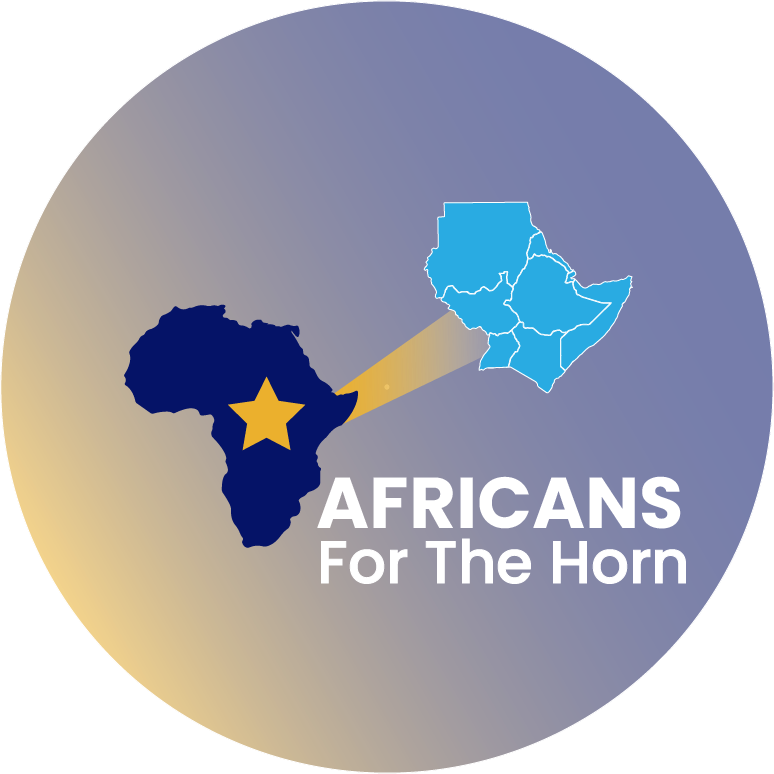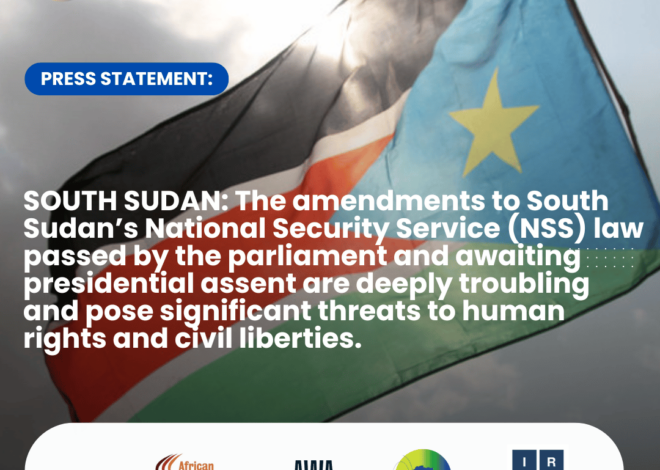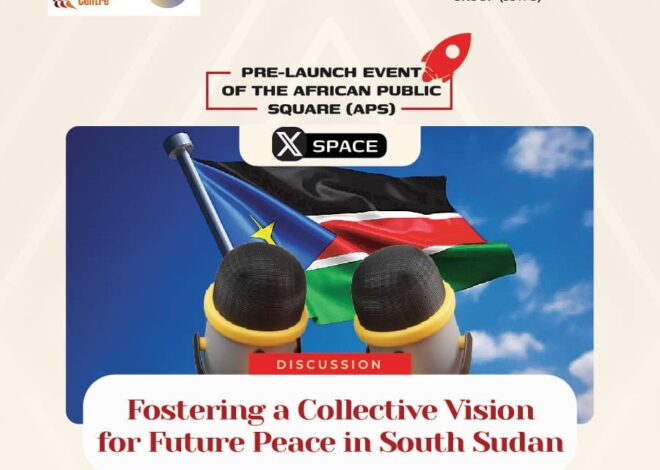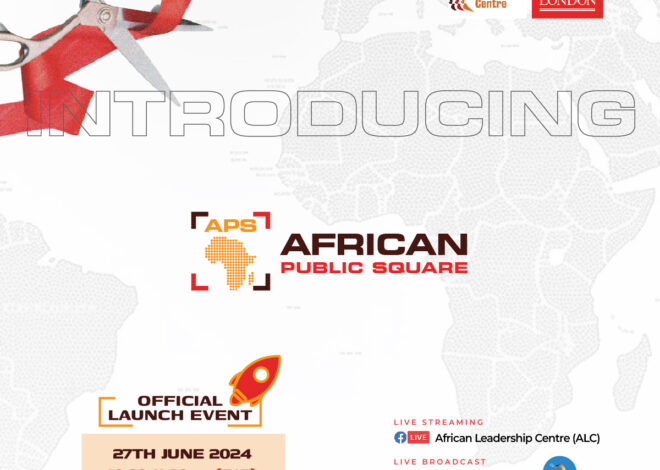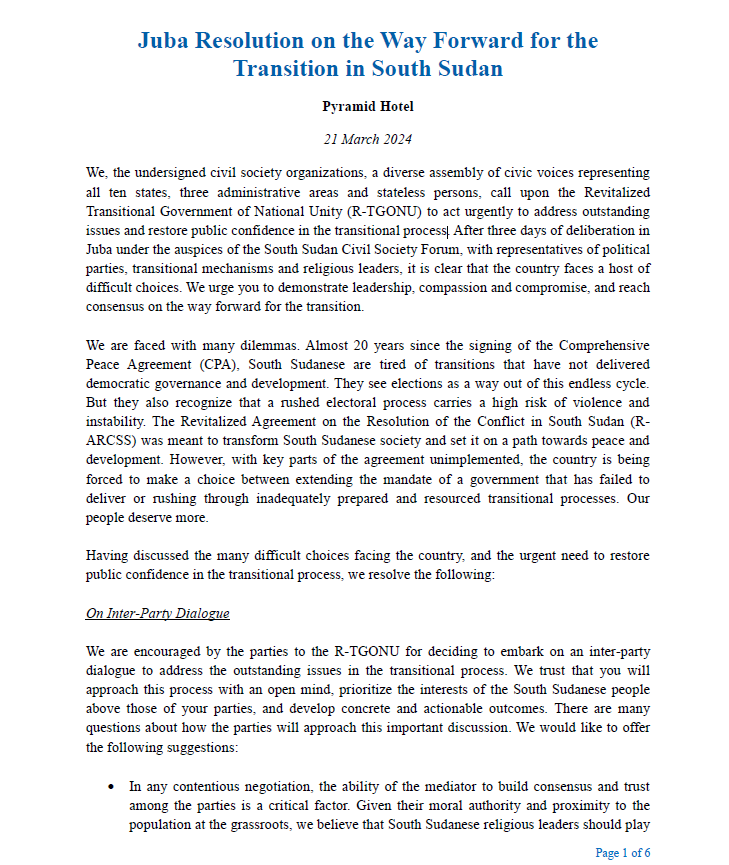
Juba Resolution on the Way Forward for the Transition in South Sudan
We are faced with many dilemmas. Almost 20 years since the signing of the Comprehensive Peace Agreement (CPA), South Sudanese are tired of transitions that have not delivered democratic governance and development. They see elections as a way out of this endless cycle. But they also recognize that a rushed electoral process carries a high risk of violence and instability. The Revitalized Agreement on the Resolution of the Conflict in South Sudan (R-ARCSS) was meant to transform South Sudanese society and set it on a path towards peace and development. However, with key parts of the agreement unimplemented, the country is being forced to make a choice between extending the mandate of a government that has failed to deliver or rushing through inadequately prepared and resourced transitional processes. Our people deserve more.
Having discussed the many difficult choices facing the country, and the urgent need to restore public confidence in the transitional process, we resolve the following:
On Inter-Party Dialogue:
We are encouraged by the parties to the R TGONU for deciding to embark on an inter-party dialogue to address the outstanding issues in the transitional process. We trust that you will approach this process with an open mind, prioritize the interests of the South Sudanese people above those of your parties, and develop concrete and actionable outcomes. There are many questions about how the parties will approach this important discussion. We would like to offer the following suggestions:
- In any contentious negotiation, the ability of the mediator to build consensus and trust among the parties is a critical factor. Given their moral authority and proximity to the population at the grassroots, we believe that South Sudanese religious leaders should play a central role in the mediation effort. As stakeholders to the R ARCSS, civil society, youth groups and women’s groups should also be included, both for our technical support and as a bridge between the process and the people of South Sudan.
- In terms of scope, the parties face a difficult choice. The transitional processes are interrelated and cannot be tackled in isolation from one another, but we cannot open the entire agreement to renegotiation. Mediators should work with the parties to focus the discussions on key priorities for the remaining transitional activities without allowing any one process to crowd out the others.
- Dialogue should not be a one-off event. We urge our political leadership to seize the opportunity and transform the culture of political decision-making into one that is characterized by flexibility and win-win solutions rather than accusations, inflammatory statements and zero-sum thinking.
- Lastly, we do not need this process to produce more promises that fail to deliver results. The outcomes of the dialogue should include robust mechanisms for monitoring and enforcement, such that actors can be held accountable for any failure to abide by their commitment.
On Elections:
As it stands now, South Sudan is not ready for an inclusive, free, fair, credible, and peaceful electoral process. If we continue on this trajectory and pace, credible elections cannot be held in December 2024. Among the key benchmarks for elections are the establishment of safety and security in areas affected by conflict, a decision on how constituencies will be determined, voter registration and robust civic education, including modalities for involving IDPs and refugees, and expediting the registration of political parties (e.g., by addressing questions of how parties with armed wings can be registered when the unification of forces remains incomplete, different interpretations of the timeline for registration, and many other contentious issues). We call on the parties to accelerate implementation of these steps as a key agenda item in the inter-party dialogue. We also urge the political leadership to reach out to our people in a spirit of unity, calm their fears, and assure the public that they will not let political competition devolve into violent conflict. Lastly, we ask that they take affirmative steps to increase the participation of women and youth in the electoral process and other transitional processes.
On Constitution Making:
The constitution-making process needs adequate time and space if it is to deliver on its promise of a people’s driven constitution. The constitution-making process is a cornerstone of nation-building in South Sudan and should not be rushed as a tick-box exercise on the way to elections. As part of the inter-party dialogue, the parties should try to reach a consensus decision on the timeline for constitution-making, including the question of whether the permanent constitution will be enacted before or after elections.
On Transitional Justice:
We commend the Ministry of Justice and Constitutional Affairs for working in a collaborative manner with the citizens of South Sudan to develop legislation for the Commission on Truth, Reconciliation and Healing (CTRH) and the Compensation and Reparations Authority (CRA). Although it took longer to develop this legislation than we would have hoped, we are encouraged by the effort that was made to consult the people of South Sudan and incorporate their views into the draft bills.
We now ask the Transitional National Legislative Assembly (TNLA) to hold public hearings on the CTRH and CRA bills and enact the legislation without further delay. The government should move quickly to operationalize the two institutions so that they can begin this critically important process, with the understanding that the institutions will continue their work after the transitional period has ended. The R-TGONU and the African Union (AU) should also adopt a clear timeframe for establishment of the Hybrid Court for South Sudan (HCSS), even as they work to promote the prosecution of conflict-related crimes through domestic accountability mechanisms. Most importantly, marginalized groups, including survivors, IDPs and refugees, must be engaged throughout this process.
On Civic and Political Space:
We have witnessed the toll that civil war has taken on civic and political space in the country. If the R–TGONU do not act urgently to address restrictions on freedom of speech, association and assembly, the space that we have left may soon disappear. We call upon the R–TGONU to amend of the National Security Services (NSS) Act to remove the NSS’s police powers, and formally rescind restrictions on the ability of civic actors to freely convene to discuss matters of public interest are key milestones in this regard.
On Security Arrangements:
The R-TGONU should expedite the graduation and deployment of necessary unified forces (NUF) and unify command at all levels to create a conducive environment for the remaining transitional processes. Incentives should be put in place for military personnel to lay down their arms, rather than encouraging defections and inciting violence in their communities. The government should also urgently act to provide for the welfare of the armed forces, including by providing uniforms, paying salaries, and providing food and medicine. Importantly, we must address border security, particularly along our northern border, where there is a high risk of a spill over of violence from the war in Sudan, and along the southern border with Uganda and Kenya.
On the Economy:
We do not have to tell you that the economic difficulties that our people face have become unbearable. While many of the factors influencing our economy are outside of our control, we should not underestimate the role that political stability could play in attracting investment and increasing economic production in South Sudan. This significantly raises the stakes in the transitional process. If our political leadership is able to manage the remainder of the transition responsibly and effectively, it will send a signal to the people of South Sudan and the outside world that we are turning the page on war and embarking on a new beginning. This would significantly ease our economic burdens.
We are at a defining moment in South Sudan’s history. Amid the current economic hardship and turmoil, our people are desperate for a brighter future and a nation that lives up to the liberation ideals for which we all struggled for so many years. We civil society, political leaders, technocrats, and our international partners must all recommit ourselves to the transitional process and its principles of dialogue, justice and reconciliation. We have developed strategies to guide our actions as civil society and stand ready to work collaboratively with other civic groups, including religious leaders, academia, media and other eminent personalities, to make a positive contribution to the transitional process. We also pledge to reconvene again over the course of the year to take stock of the progress we have made and sustain our engagement through the remainder of the transition. Let us seize this opportunity to promote a legacy of peace for generations to come.
***END***
Signatories:
- Abyei Civil Society Organization
- ACROSS
- Action 54
- Africa Democracy and Resilience Network AWARD
- African Leadership and Reconciliation Ministries (ALARM)
- African Leadership Center ( Nairobi)
- African Relief Ministries
- Africans for the Horn of Africa Initiatives
- Agency for Humanitarian Assistance and Development (AHD)
- Agriculture and Farmers’ Cooperative Society (AFCS)
- Agencies for Women Empowerment and Development (AWED)
- Animu Athiel Foundation
- Center for Gender Studies and Transitional Justice (CGSTJ)
- Center for Peace and Advocacy (CPA)
- Centre for Democracy and Development
- Centre for Inclusive Governance, Peace and Justice (CIGPJ)
- Central Equatoria State Civil Society Network (CESCSN)
- CES Activists network
- Christian Action for Development and Supports (CADS)
- Christian Agency for Peace and Development (CAPAD)
- Christian Vision Organization (CVO)
- Citizens News Paper, South Sudan
- Civil Society Coalition on Defense of Civic Space (CSCDCS)
- Civil Society Organization Network Lakes State (CISON)
- Community Empowerment for Progress Organization (CEPO)
- Dialogue and Research Institute (DRI)
- Eastern Equatoria State Civil Society Network
- Eve Organization for Women
- Forum for Policy Dialogue (FPD)
- Humanity and Community Empowerment Organization
- Initiative for Peace Communication Associations (IPCA)
- Inspiration Youth Advocacy Network (IYAN)
- Institute of Social Policy and Research (ISPR)
- Intrepid South Sudan (ISS)
- Jonglei Civil Society Network (JESN)
- Justice Advisory Group (JAG)
- Media Women Empire
- National Women Forum
- Network for Civil Society Organizations ( WES
- Organization of Nonviolence and Development (ONAD)
- Peace and Development Organization
- Peace Link Foundation (PLF)
- Peace, Development and Collaborative Organization (PDCO)
- Raise Women’s Voice Organization
- Roots for Development
- Save Orphan Life Organization (SOLO)
- Solidarity Ministry Africa for Reconciliation and Development (SMARD)
- South Sudan Action Network on Small Arms (SSANSA)
- South Sudan Civil Society Forum (SSCSF)
- South Sudan Democratic Elections and Monitoring Program (SUDEMOP)
- South Sudan Human Rights Defenders Network (SSHRDN)
- South Sudan Law Society (SSLS)
- South Sudan Youth Constitutional Working Groups (SSYCW)
- South Sudan Youth Peace and Development Organization (SSYPADO)
- South Sudan Youth Society for Peaceful Co-existence (SSYSPC)
- South Sudanese Network for Democracy and Elections (SSuNDE)
- South Sudan Women’s Empowerment Network (SSWEN)
- SPACE
- Special Action for Life Transformation (SALT)
- Survivor Network of South Sudan (SUNS)
- Survivor Network in South Sudan
- TERAB FM
- Transitional Justice Working Group (TJWG)
- Unity State Civil Society Network (USCSN)
- Upper Nile State Civil Society (USCSO)
- Vision for Generation Organization (V4G)
- Vision for Humanity South Sudan
- Vision South Sudan (ViSS)
- Voice for Change (VFC)
- Wau Civil Society Organizations Network (WASON)
- Widows Orphans Development Agency
- Women for Justice and Equality
- Women International Peace Center
- Women Partners for Health (WOPAH)
